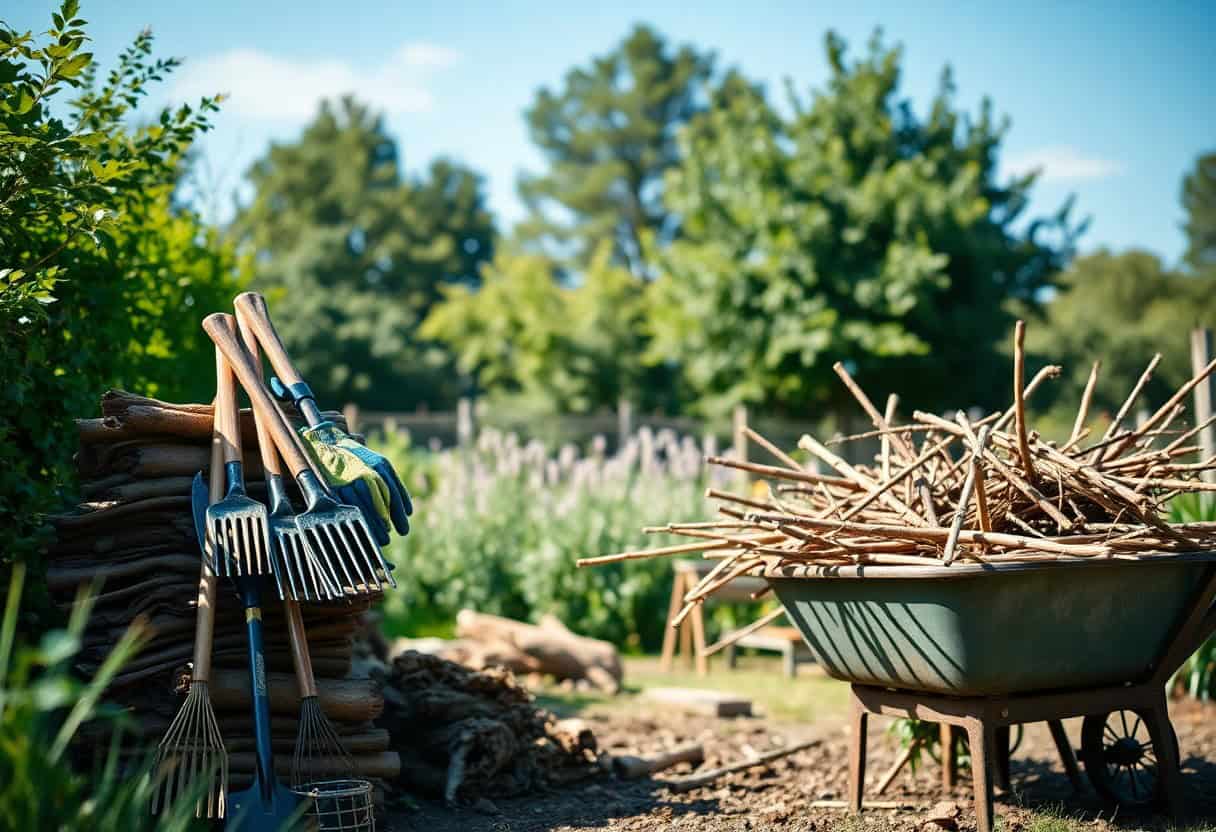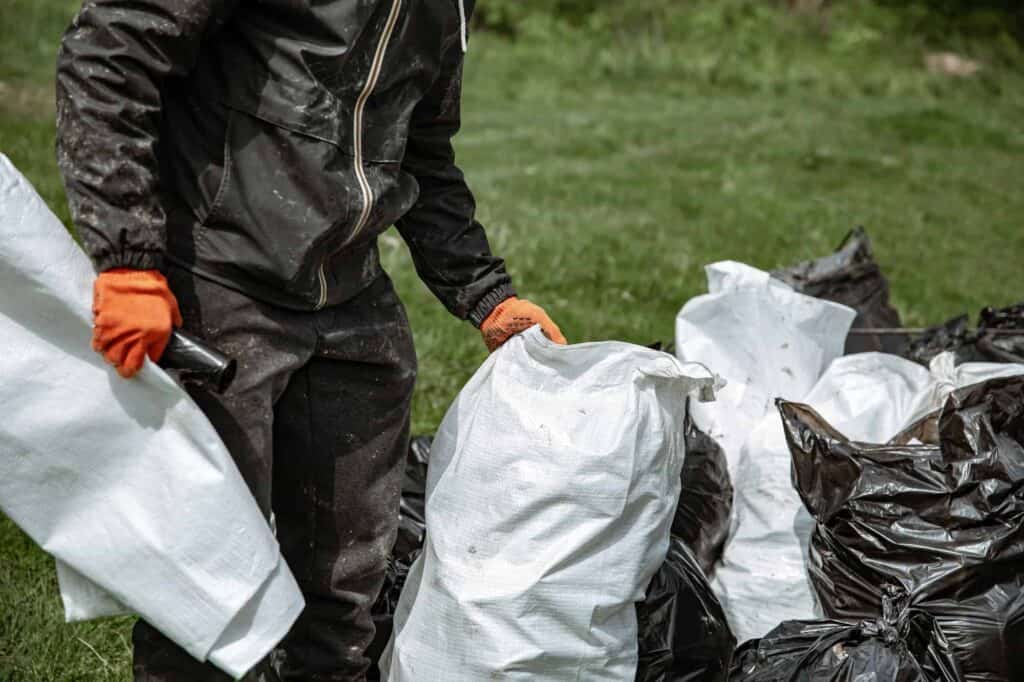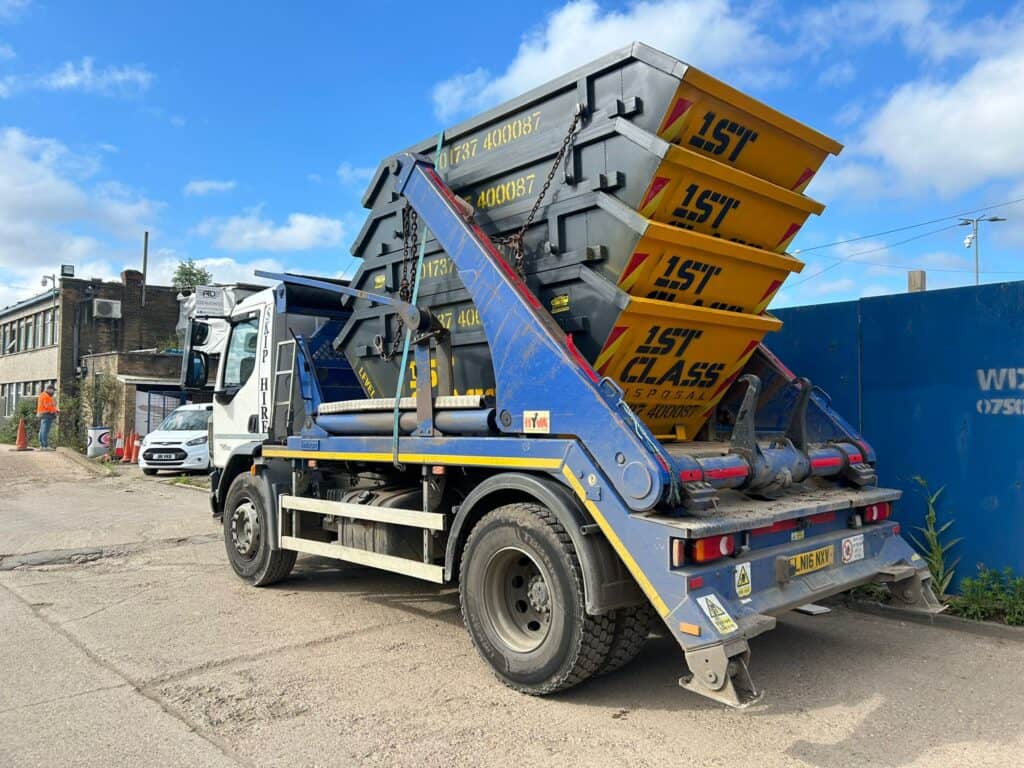Clearance of your garden can be an overwhelming task, but it doesn’t have to be. With some organised planning and a few strategic tips, you can transform your outdoor space into a serene retreat. Start by assessing your garden’s needs, prioritising safety, particularly when handling sharp tools or disposing of heavy debris. For practical advice, check out these Tips for stress-free garden clearances – PAT Testing. Embrace the process, and soon you’ll enjoy a revitalised space!
Planning Your Garden Clearance
To ensure a smooth garden clearance, begin with a detailed plan that outlines your objectives and timeline. Assess the size of your garden and define which areas need immediate attention. For more effective strategies, check out these Top 10 Expert Tips for Creating A Low Maintenance Garden that can simplify your tasks and reduce future upkeep.
Assessing the Area
Area identification is key to a successful clearance. Walk through your garden, taking note of the specific areas that require work, such as overgrown plants, debris, or hazardous components. This evaluation will help you develop a focused approach that includes priority tasks and potential obstacles.
Creating a Clearance Checklist
With a checklist in hand, you can keep your garden clearance organised and efficient. Outline the tasks you need to accomplish, prioritising items based on urgency and safety. This method will help prevent missed details that could lead to injuries or additional work later on.
Hence, a well-structured checklist will enhance your efficiency and safety during the garden clearance. Your list should include tasks such as removing debris, trimming overgrown plants, and identifying any potential hazards like sharp objects or toxic plants. By ticking off tasks as you complete them, you’ll feel a sense of accomplishment while maintaining focus on what’s left. This systematic approach not only helps you stay organised but also ensures a successful and enjoyable gardening experience.
Essential Tools and Equipment
Any successful garden clearance in Surrey requires the right tools and equipment to streamline the process and enhance efficiency. You should consider including a range of tools such as shears, rakes, spades, and garden forks in your arsenal. Additionally, having a sturdy garden waste bin or bags will ensure easy disposal of debris, keeping the area tidy as you work. Invest in quality items to make your gardening tasks smoother and more enjoyable.
Must-Have Tools
Beside the basic tools, you may want to have a garden hoe and a robust pair of gloves to protect your hands while digging and clearing. A sturdy wheelbarrow can also be a lifesaver for transporting heavier materials and refuse, significantly saving you time and effort. Don’t forget to include a good quality pruning saw for larger branches that need to be cut down, ensuring your garden looks its best.
Safety Gear and Precautions
Below are several key safety measures you should take during your garden clearance. Equip yourself with protective gloves, eye protection, and sturdy footwear to guard against potential injuries. Depending on the scale of your work, consider ear protection if using loud machinery, and a dust mask can be beneficial when dealing with debris. Always ensure your tools are in good condition to avoid accidents.
With proper safety gear and precautions, you significantly minimise the risks associated with garden clearance. Wearing gloves protects your hands from cuts and scrapes, while glasses shield your eyes from flying debris. Adequate footwear is vital to prevent slips and falls on uneven ground. Before using any machinery, check that it’s in good working order to avoid malfunctions. Taking these steps not only keeps you safe but also makes your garden clearance process much smoother.
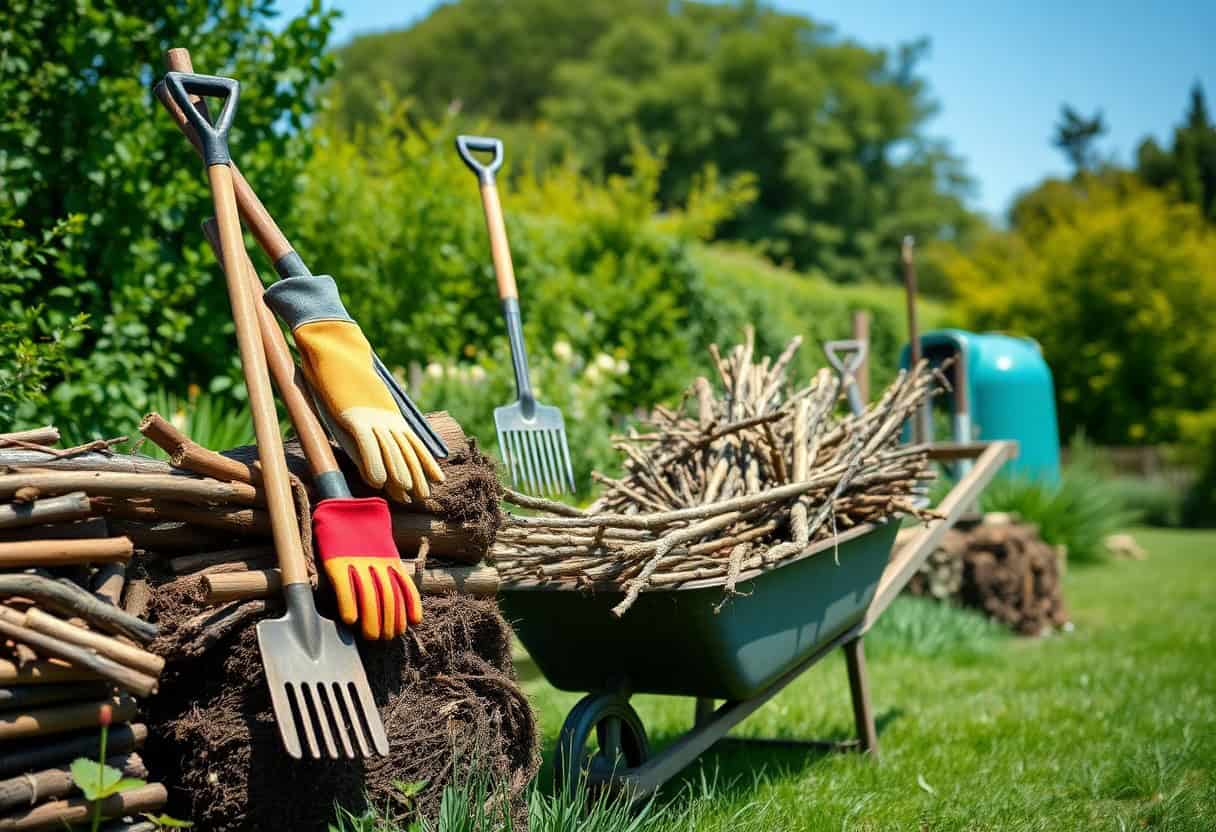
Clearing Techniques
You can simplify your garden clearance by employing effective clearing techniques. Start by segmenting your garden into manageable sections and tackle one area at a time. Use tools like rakes, spades, and shears to efficiently clear debris. For expert advice, check out Tips On Your Garden Clearance Go Smoothly.
Green Waste Disposal
Before you dispose of green waste, check your local council’s regulations regarding composting and collection. By separating organic matter like leaves and grass clippings, you can create compost for your garden or ensure proper disposal.
Managing Hardscape Debris
Along with organic waste, you may encounter hardscape debris such as bricks, stones, and old garden furniture. It’s important to assess these materials for any potential recycling options as they could be repurposed or salvaged.
And while managing hardscape debris, always wear protective gloves and appropriate footwear to avoid injuries. Be cautious when lifting heavy items, as improper handling can lead to strain or accidents. Consider hiring a skip for significant amounts of debris, ensuring you comply with local disposal laws. It’s not only efficient but also helps keep your garden area tidy.
Eco-Friendly Practices
Your garden clearance can be an eco-friendly affair by adopting sustainable practices. Emphasising the use of natural materials and minimising waste not only helps the environment but also makes your gardening more fulfilling. Implementing effective solutions supports biodiversity and contributes to a healthier ecosystem in your local area.
Composting Organic Material
Beside minimising waste, composting organic material transforms garden scraps into nutrient-rich compost. This process reduces landfill pressure and creates natural fertiliser for your plants. Start by collecting kitchen waste, grass clippings, and fallen leaves. By composting, you enrich your soil while promoting sustainable gardening practices.
Recycling Tips
Composting isn’t the only way to be eco-friendly; you can also recycle various garden materials. Here are some tips to help you:
- Use recyclable containers for plant storage
- Repurpose old tools instead of discarding them
- Donate plants that you no longer need
Knowing how to manage your garden waste can make a significant impact.
At the same time, recycling tips can extend beyond basic practices. Engaging in community initiatives can ensure that plant debris and garden waste are collected and reused effectively. Collaborating with local organisations often enhances your recycling efforts:
- Join a community composting programme
- Participate in local plant exchanges
- Attend workshops on sustainable gardening
Knowing the right avenues for recycling can lead to a more vibrant and sustainable gardening experience.
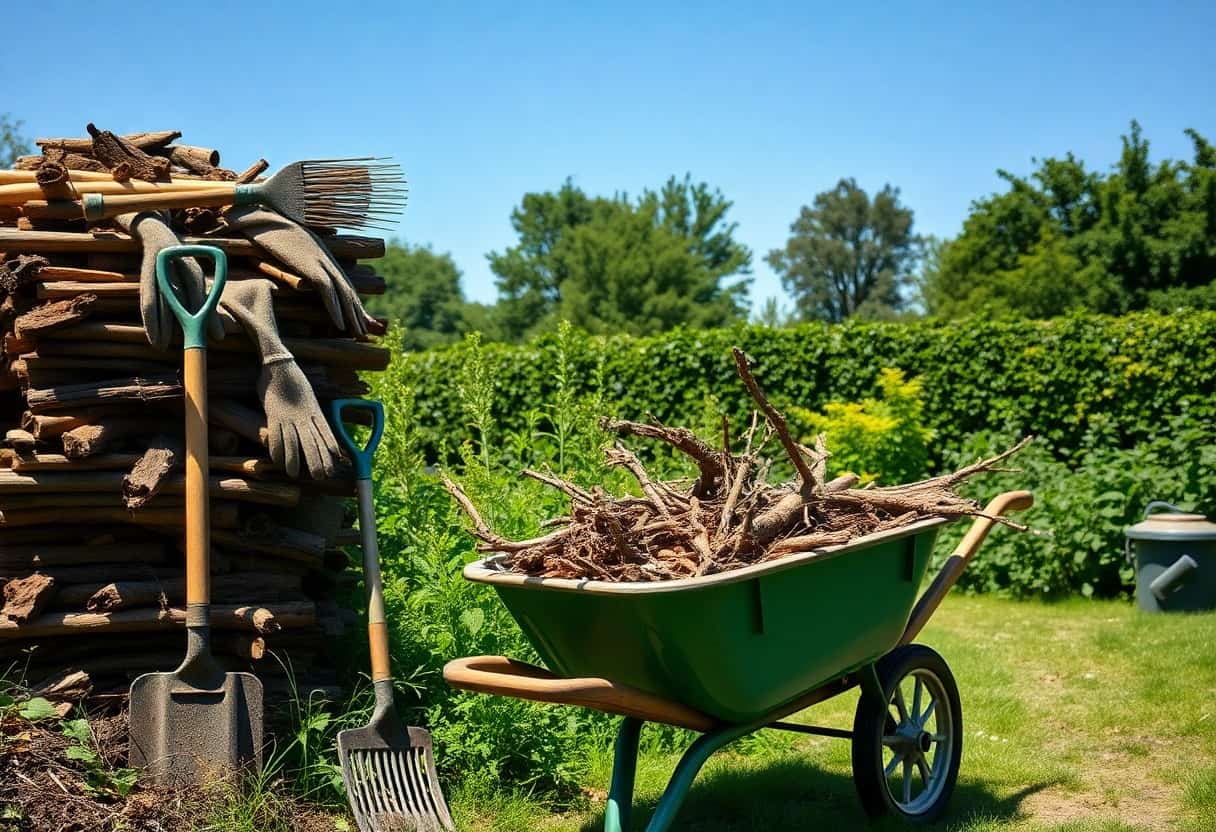
Enlisting Professional Help
Keep in mind that tackling a garden clearance on your own can be overwhelming, especially if your space is overgrown or has large debris to remove. Enlisting professional help can save you time and energy, ensuring the job is done efficiently and safely, so you can enjoy your outdoor space without the stress of managing everything yourself.
When to Call a Service
To determine the right time to call in a professional, consider the size of your garden and the amount of waste that needs clearing. If the task feels too big, or if you’re dealing with hazardous materials, it’s wise to seek help sooner rather than later.’
Choosing the Right Contractor
On your journey to find the perfect contractor, focus on their experience, reputation, and range of services offered. You want someone who understands your specific needs and can tailor their approach accordingly.
Considering the selection of your contractor is crucial for a successful garden clearance. Look for qualified professionals who have a proven track record and can provide references. Ensure they are fully insured to manage potential risks, especially if you’re dealing with larger items or landscaping projects. Additionally, check for online reviews and ask for quotes to compare services and prices. A knowledgeable contractor can offer valuable insights and recommendations to enhance your garden space while ensuring a smooth clearance process.
Maintaining a Tidy Garden Post-Clearance
Once again, keeping your garden tidy after a clearance is imperative for enjoying your outdoor space. Regularly removing debris, excess foliage, and weeds will help maintain the pristine condition of your garden. Incorporate a system for managing seasonal plant growth and residual mess, ensuring that your cleared area stays inviting and clutter-free.
Regular Maintenance Schedule
For effective garden upkeep, establish a consistent maintenance schedule that suits your lifestyle. This could involve weekly or bi-weekly checks to ensure that your garden remains in top shape and free from unwanted growth.
Seasonal Tips and Tricks
Any garden can flourish with the right seasonal care. Utilise specific seasonal tips to enhance the health and beauty of your outdoor space. Here are some suggestions:
- In spring, fertilise your soil to promote strong plant growth.
- During summer, stay vigilant against weeds and pests.
- In autumn, prepare your garden for winter by pruning and mulching.
- Winter is an excellent time for planning and gathering ideas for your spring garden.
Assume that applying these strategies can lead to a thriving garden throughout the year.
The key to seasonal success lies in your approach to care and attention. Incorporate practices such as great mulching in autumn and regular weeding in summer to manage your garden effectively. Investing time into seasonal preparation not only enhances the aesthetics but also promotes healthy plant growth. With dedicated effort, you can create a well-maintained outdoor sanctuary. Assume that with such methods, your garden will undoubtedly flourish.
Conclusion
Now that you’ve explored quick tips for a stress-free garden clearance in Surrey, you are well-equipped to tackle your project with confidence. Organising your tasks, decluttering efficiently, and enlisting help when needed can transform your garden into a serene space. By following these straightforward strategies, you can eliminate unnecessary stress and enjoy a refreshed outdoor environment that complements your lifestyle. Take action and enjoy the satisfaction that comes with a well-maintained garden.
FAQ
Q: What preparations should I make before starting my garden clearance in Surrey?
A: Before you begin, it’s important to assess the area you plan to clear. Take some time to identify the plants you wish to keep and those that need to go. Clear a space for your waste and tools, ensuring you have all necessary equipment ready. Consider wearing suitable clothing and sturdy gloves to protect yourself during the process.
Q: What tools are crucial for an effective garden clearance?
A: The crucial tools you might need include a pair of pruning shears for cutting back overgrown plants, a spade for digging, a rake for gathering debris, a garden fork to turn over soil, and sturdy bags or containers for waste collection. Having these tools at hand will help the clearance process run smoothly.
Q: How can I dispose of garden waste properly in Surrey?
A: In Surrey, you have several options for garden waste disposal. You can utilise local council green waste collections, take it to a household waste recycling centre, or consider composting some of the organic material at home. If you have a large amount of waste, hiring a skip might also be a practical solution.
Q: What time of year is best for garden clearance?
A: The ideal time for garden clearance typically aligns with the seasons. Early spring or autumn are often considered the best times, as the weather is generally mild and the ground is easier to work with. Additionally, clearing in spring allows you to prepare for new growth, while autumn clearance can help tidy up the garden before winter sets in.
Q: How can I minimise stress during the garden clearance process?
A: To minimise stress, break the task into smaller, manageable sections, tackling one area at a time. Setting a timer for work sessions can help you stay focused while also allowing for regular breaks. Enlisting the help of friends or family can also make the experience more enjoyable, making it a social activity rather than a chore.

